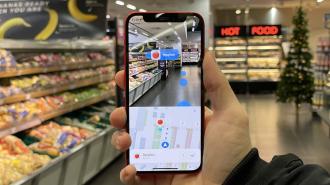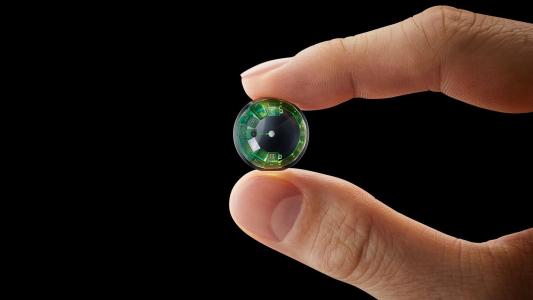A new AR shopping app takes the guesswork out of navigating giant stores — and in the future, it could help you get around airports, museums, and more.
The problem: To drive somewhere new, you can just use a navigation app like Google Maps, and it will map your route, give you turn-by-turn directions, and even show you the view from the street.
But GPS isn’t usually accurate enough to guide you inside a building — which you may have realized if you’ve ever gotten frustrated trying to find a room in a hospital, a gate at the airport, or anything unfamiliar in a grocery or big box store.
“We decided on grocery stores, because it’s the hardest challenge that we could have solved.”
Andrew Hart
The idea: Dent Reality, a London-based startup, has now developed an augmented reality (AR) app to help you easily navigate these spaces, and for its first trial, they’ve teamed up with UK retailer Marks & Spencer (M&S).
Since January, shoppers at an M&S location in London have been able to enter any product into the app and get directions right to it projected onto their camera view. If they enter a whole grocery list, the AR shopping app will calculate the quickest route to get everything — no endless backtracking.
A new feature added in June will even create a grocery list based on M&S recipes chosen by shoppers and then show them where to find the ingredients.
Shoppers face their phone’s camera away from them, and their screen will then project useful graphics on top of the feed of the real world store. They can also choose to point their phone downward and just have a compass guide them.
To keep track of product locations, the app pulls data from M&S’s digital planograms — the diagrams that retailers use to decide how and where to display merchandise. Any time M&S updates its planograms, its AR shopping app updates, too.
Food for thought: Customers familiar with the store’s layout might not need the AR shopping app to find most items, but Dent Reality views the M&S store as an ideal testing ground for its platform due to the density of different “destinations” (i.e., products) in a grocery store.
“We decided on grocery stores, because it’s the hardest challenge that we could have solved,” CEO Andrew Hart told TechCrunch in November 2021.

It’s also a great way for Dent Reality to prove itself to grocers, who have been among the groups expressing the most interest in the startup’s tech, according to Hart — and not just for its ability to guide customers to products.
“They want to improve their customer experience, surface recommendations and recipes, and bring all the things they do online, to the in-store experience,” he told the Grocer in December 2021. “And the second thing is — they want to improve their online order picker efficiency.”
The app could prove very useful for the workers who fill online orders, whether for the store or third-party services like Instacart or Uber Eats, since a lot of their time is spent searching aisles and shelves.
The big picture: The tech industry has been exploring AR since the ‘90s, but we’ve yet to see any applications really take off with the mainstream, unless you count that month in 2016 when we were all playing Pokémon GO.
Once comfortable, affordable AR glasses or contacts are available, we could see a surge in interest, but Dent Reality’s smartphone-based AR meets a clear need, works with existing tech in everyone’s pocket, and has countless potential applications.
“Our vision is that every physical space will become digitally connected.”
Andrew Hart
With the $3.4 million the startup raised in late-2021, a future in which Dent’s AR apps are available at all your favorite locations starts to come into focus.
“Our vision is that every physical space will become digitally connected, enabling an entirely new type of interaction with the world around us,” said Hart. “These ‘smart spaces’ will unlock rich information and transform billions of daily interactions for shoppers and retailers.”
We’d love to hear from you! If you have a comment about this article or if you have a tip for a future Freethink story, please email us at [email protected].






